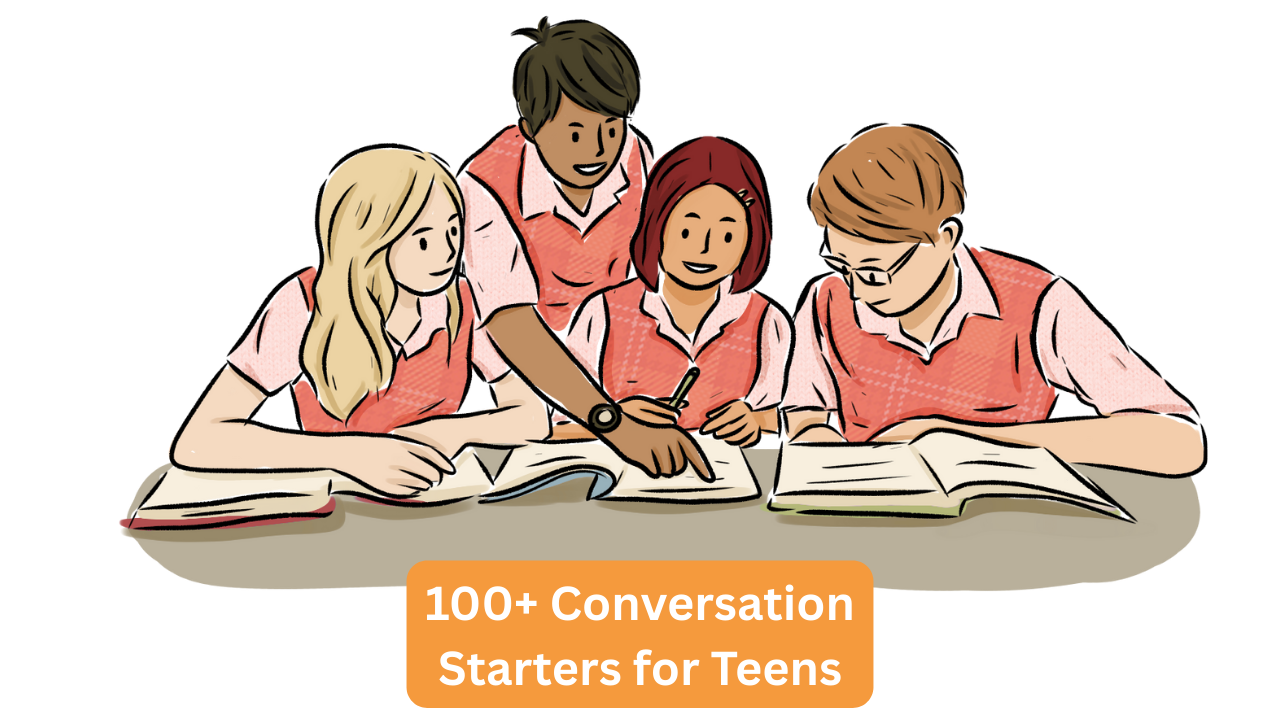100+ Conversation Starters for Teens
Talking to teens isn’t always easy. Whether you’re a parent, teacher, or friend, it can be hard to start a conversation that goes beyond one-word answers. Teens are navigating a complex world of emotions, social pressures, and personal discovery. They often want to talk—but don’t know how to begin. That’s why good conversation starters matter.
Starting a conversation with a teen using the right approach can build trust, encourage openness, and strengthen relationships. When teens feel heard, they’re more likely to share, grow, and develop strong communication skills that serve them throughout life.
Teenagers go through a critical phase of emotional and social development. According to psychologists, open and supportive communication helps teens build confidence, manage stress, and form healthy relationships. However, studies show that many teens feel isolated or misunderstood, especially in the age of smartphones and social media.
Related Articles
- Christmas Movie Trivia Questions
- 60+ Christmas Would You Rather Questions
- Christmas Conversation Starters
- Christmas Trivia Questions for Kids
- Christmas Trivia: 250+ Fun Questions With Answers
- 50+ Dinner Party Icebreakers That Make Conversations Flow Effortlessly
- 60+ Networking Conversation Starters: Make Connections Easily
Face-to-face conversations help counteract that isolation. Teens who regularly engage in meaningful conversations are more likely to have strong problem-solving skills, better emotional regulation, and closer relationships with adults and peers. The key is to create space for real talk—without judgment, pressure, or awkwardness. please check out our random topic generator to find more topics and conversation starters.
If you are running out of ideas and don’t know what to write or talk about, our random topic generator can help you quickly find simple and interesting topics for writing, conversations, and brainstorming with just one click.
Tips for Starting Meaningful Conversations
Before jumping into the list of conversation starters, here are a few tips to make your conversations more effective:
- Be present: Put away phones and distractions so teens feel valued and listened to.
- Start light: Begin with casual topics and ease into deeper ones.
- Listen actively: Don’t interrupt—just listen and reflect.
- Avoid judgment: Teens open up more when they feel safe and not criticized.
- Ask open-ended questions: These require more than a yes or no answer and invite reflection.
Best Conversation Starters for Teens
Below is a categorized list of engaging conversation starters designed to help teens open up, reflect, and build stronger connections with peers, parents, or mentors. These questions promote self-awareness, curiosity, and honest dialogue—whether you’re breaking the ice or deepening an existing relationship.
If you’re ever stuck and need fresh ideas, don’t forget to try our Random Topic Generator —a free tool that instantly gives you unique topics and questions to spark conversations or even inspire writing and class discussions.
1. Getting to Know You
These icebreaker questions are perfect for new friendships, social settings, or classrooms. They help teens learn more about one another in a light and friendly way, setting the stage for more meaningful talks later.
- What’s your favorite thing to do on weekends?
- If you could travel anywhere in the world, where would you go?
- What’s a movie or show you could watch over and over again?
- If you could meet any celebrity, who would it be and why?
- What’s something most people don’t know about you?
These prompts are ideal for holiday conversation starters or orientation days when teens may feel nervous about connecting with new people.
2. Self-Discovery and Identity
Teen years are a time of self-exploration and identity formation. These questions invite introspection and help teens express who they are, who they want to become, and what matters most to them.
- What three words would you use to describe yourself?
- What makes you feel the most confident?
- How do you usually handle challenges or setbacks?
- What do you want to be remembered for?
- When do you feel most like yourself?
Encouraging these reflections early can lay the foundation for mental health conversations and self-acceptance in the long term.
3. School and Learning
School dominates much of a teen’s life. These prompts go beyond the usual “How was your day?” and help teens think about how they learn, what they enjoy, and how school affects them.
- What’s the most interesting thing you’ve learned this year?
- If you could change one thing about your school, what would it be?
- Who’s a teacher who made a big impact on you?
- Do you learn better by listening, reading, or doing?
- What’s one subject you wish schools taught?
These types of questions also make great research paper topics for high school students—you can build full essays or presentations based on academic interests that emerge from such conversations.
4. Friendships and Social Life
Social relationships are critical during the teenage years. These questions encourage teens to think about their friendships, values, and how they navigate peer interactions.
- What do you look for in a good friend?
- Have you ever had a falling out with a friend? What happened?
- How do you handle peer pressure?
- Who in your life makes you feel truly supported?
- How do you like to spend time with your friends?
These conversations can be used to build stronger peer support or even inspire leadership roles in youth programs.
5. Dreams and Future Goals
Looking ahead is exciting but sometimes overwhelming. These questions help teens articulate their hopes and plan for their futures in a positive, goal-oriented way.
- What’s one big goal you hope to achieve in the next five years?
- If money didn’t matter, what job would you love to have?
- What does success look like to you?
- Who do you look up to when it comes to chasing dreams?
- What’s something new you want to try this year?
These discussions not only build motivation but can also serve as prompts for college essays, career planning, or creative writing assignments.
6. Feelings and Mental Health
Checking in emotionally is essential for teen well-being. These gentle questions help teens reflect on how they’re doing inside and what they need to feel balanced and supported.
- What helps you feel better when you’re stressed or overwhelmed?
- Do you find it easy or hard to talk about your feelings? Why?
- How do you recharge when you’re feeling drained?
- What does a “good day” look like for you?
- How do you usually deal with failure or disappointment?
Conversations about mental health should be normal and safe. These prompts are a great starting point for ongoing emotional awareness and self-care habits.
7. Pop Culture and Media
These are lighthearted and relatable questions that teens love. Pop culture is a big part of their world, and talking about it helps adults or peers stay connected to what matters to them.
- What song are you obsessed with right now?
- Do you follow any content creators or influencers?
- What app do you spend the most time on?
- What’s a trend you find really funny—or really weird?
- If you could create your own TV show, what would it be about?
These questions are great for starting casual chats that naturally lead to deeper conversations once trust is built.
8. Values and Opinions
These thoughtful questions help teens develop critical thinking, explore ethical ideas, and understand their personal values.
- What do you think makes a person “good”?
- What cause or issue do you care most about?
- Do you believe one person can make a difference? Why or why not?
- What’s something you’ve changed your mind about recently?
- How do you decide what’s right or wrong?
They’re excellent not only for personal growth but also as essay starters for class debates, group discussions, or persuasive writing.
How Conversation Changes Lives
When teens regularly engage in meaningful conversations, they learn important life skills—like empathy, self-awareness, and conflict resolution. These skills don’t just help at school or home, but later in careers, relationships, and adulthood.
Parents and mentors who model good conversation habits—like listening without interrupting or showing genuine curiosity—help teens build trust and emotional safety. Even 10 minutes a day of real connection can lead to lasting improvements in mood, behavior, and self-esteem.
Final Thoughts
Teens don’t always know how to start deep conversations—but that doesn’t mean they don’t want to talk. With the right questions and a supportive listener, teens are often more willing to share than we expect.
Use these conversation starters to strengthen your connection with the teens in your life. Start small, be patient, and most importantly—listen with care. The more consistent and open the communication, the stronger and more meaningful your relationships will become.
Whether you’re having a family dinner, planning a youth group activity, or prepping for a school project, the right question can make all the difference. If you’re struggling to come up with fresh ideas, our Random Topic Generator is the perfect tool to spark conversation or inspire writing. You can also check out our helpful lists for Holiday Conversation Starters and Research Paper Topics for High School Students.
These tools are fast, fun, and totally free—just click, explore, and start talking!

